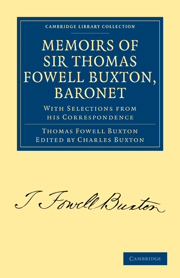Book contents
- Frontmatter
- PREFACE
- Contents
- CHAPTER I 1786–1802
- CHAPTER II 1802–1807
- CHAPTER III 1807–1812
- CHAPTER IV 1812–1816
- CHAPTER V 1816–1817
- CHAPTER VI 1818, 1819
- CHAPTER VII 1820, 1821
- CHAPTER VIII 1821–1823
- CHAPTER IX 1823–1826
- CHAPTER X 1822–1826
- CHAPTER XI 1826, 1827
- CHAPTER XII 1827, 1828
- CHAPTER XIII 1828, 1829
- CHAPTER XIV 1829
- CHAPTER XV 1829, 1830
- CHAPTER XVI 1830
- CHAPTER XVII 1831
- CHAPTER XVIII 1832
- CHAPTER XIX 1833
- CHAPTER XX 1833
- CHAPTER XXI 1833, 1834
- CHAPTER XXII 1834, 1835
- CHAPTER XXIII 1835, 1836
- CHAPTER XXIV 1836
- CHAPTER XXV 1837, 1838
- CHAPTER XXVI 1838
- CHAPTER XXVII 1838, 1839
- CHAPTER XXVIII 1839, 1840
- CHAPTER XXIX 1840
- CHAPTER XXX JUNE, 1840, TO APRIL, 1841
- CHAPTER XXXI 1841
- CHAPTER XXXII 1843, 1844
- CHAPTER XXXIII 1843, 1844, 1845
- RECOLLECTIONS OF SIR T. FOWELL BUXTON
- APPENDIX TO CHAP. XVII
RECOLLECTIONS OF SIR T. FOWELL BUXTON
Published online by Cambridge University Press: 05 July 2011
- Frontmatter
- PREFACE
- Contents
- CHAPTER I 1786–1802
- CHAPTER II 1802–1807
- CHAPTER III 1807–1812
- CHAPTER IV 1812–1816
- CHAPTER V 1816–1817
- CHAPTER VI 1818, 1819
- CHAPTER VII 1820, 1821
- CHAPTER VIII 1821–1823
- CHAPTER IX 1823–1826
- CHAPTER X 1822–1826
- CHAPTER XI 1826, 1827
- CHAPTER XII 1827, 1828
- CHAPTER XIII 1828, 1829
- CHAPTER XIV 1829
- CHAPTER XV 1829, 1830
- CHAPTER XVI 1830
- CHAPTER XVII 1831
- CHAPTER XVIII 1832
- CHAPTER XIX 1833
- CHAPTER XX 1833
- CHAPTER XXI 1833, 1834
- CHAPTER XXII 1834, 1835
- CHAPTER XXIII 1835, 1836
- CHAPTER XXIV 1836
- CHAPTER XXV 1837, 1838
- CHAPTER XXVI 1838
- CHAPTER XXVII 1838, 1839
- CHAPTER XXVIII 1839, 1840
- CHAPTER XXIX 1840
- CHAPTER XXX JUNE, 1840, TO APRIL, 1841
- CHAPTER XXXI 1841
- CHAPTER XXXII 1843, 1844
- CHAPTER XXXIII 1843, 1844, 1845
- RECOLLECTIONS OF SIR T. FOWELL BUXTON
- APPENDIX TO CHAP. XVII
Summary
“My dear C—,
“Harrow, Dee. 1847.
“l am delighted to hear that you are preparing a memoir of your dear and honoured father. Such a memoir appears to me to be indispensable. His numerous friends could not but long for details of a life of so much interest to themselves, and the public had a right to ask for all the private intelligence which could be collected as to the history of the extinction of slavery, and other holy and benevolent movements in which he acted so conspicuous a part.
“Having heard of your intention, I thought that you would forgive me, as one of his oldest and not least-attached friends, if I ventured to give you my unbiassed impression of him. I should not, however, have thus presumed if I had not heard that you would be glad of any remarks founded on the observation of his character at an earlier period than that in which you had the privilege of ministering to his happiness.
“I shall be glad to say a few words as to his intellectual, religious, moral, and social qualities.
“As to the first, then, I have no hesitation in saying, that I always regarded him as a person of the very clearest understanding and strongest common sense that I have ever known—of what we might, perhaps, call with justice, a truly fine specimen of the English mind.[…] ”
- Type
- Chapter
- Information
- Memoirs of Sir Thomas Fowell Buxton, BaronetWith Selections from his Correspondence, pp. 592 - 598Publisher: Cambridge University PressPrint publication year: 2010First published in: 1848

